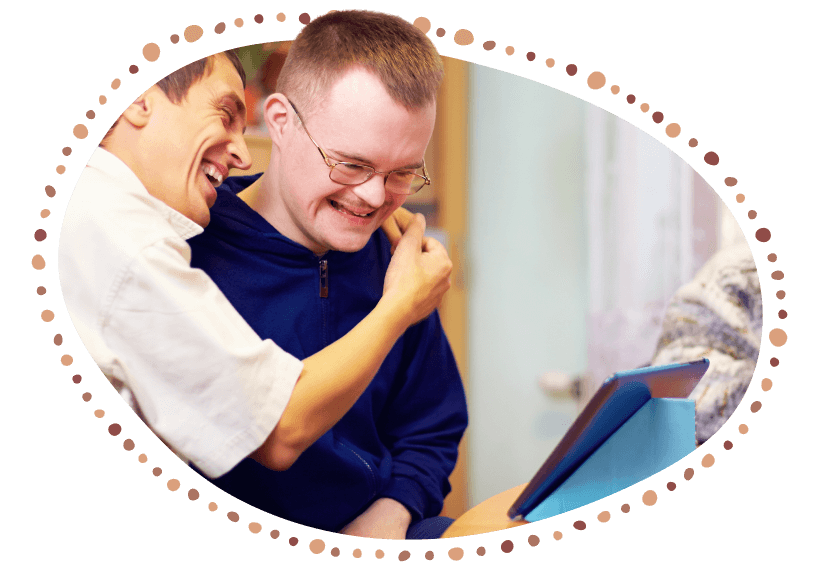Nganana’s Developmental Service Delivery
What is Developmental Service Delivery?
Developmental service delivery refers to a service that delivers a level of quality able to deliver on the objectives and principles of the National Disability Insurance Scheme – the ideals of the scheme. While these objects and principles are many and varied [see National Disability Insurance Scheme Act 2013.pdf and NDIS Act 2013 – Principles.pdf] the core intent of these statements are clear. They encapsulate the very ideology of the NDSI legislation, supporting people with disability to:
- To realise their potential for physical, social, emotional and intellectual development.
- To participate in and contribute to social and economic life.
- To be supported to exercise choice
- Positive personal and social development of people with disability, including children and young people, is to be promoted.
- To have the role of families, carers and other significant persons in the lives of people with disability is to be acknowledged and respected.
- In exercising their right to choice and control, people with disability require access to a diverse and sustainable market for disability supports in which innovation, quality, continuous improvement, contemporary best practice and effectiveness in the provision of those supports is promoted.
- To have the same right as other members of Australian society to be able to determine their own best interests, including the right to exercise choice and control, and to engage as equal partners in decisions that will affect their lives.
Why Use Developmental Service Delivery?
So to answer the question of why operate NDIS funded services from a developmental perspective, it is simply to achieve those statements detailed above; to achieve wellbeing, choice and control, an opportunity to facilitate growth, learning; an opportunity to live an “ordinary life”.
Some people believe that a service can be simplified and still achieve results approximating developmental outcomes. For people living with complex needs, and especially those who need 24/7 support (Supported Independent Living – SIL), the need for a well planned, organised, and implemented SIL becomes even more essential [see The Sanctuary model research – The MacKillop Institute 2021.pdf].


This document outlines some of the research behind the development of the Sanctuary model which identifies the need for strategic and systematic implementation of structure and standards underpinning practices designed to produce positive and valued outcomes for participants. The Sanctuary Model has been adapted by the Department of Child Protection for use across their residential care services.
There is evidence that for people with complex needs a developmental model is essential, and without it, a participant will never be given the opportunity to grow and realise their potential, participate and contribute, exercise choice, and engage as equals.
Our Developmental Service Delivery Model
Local Coordination
Local coordination is delivered by a coordinator employed by the provider. Nganana employs the equivalent of level two coordinators to support all services, in particular supported independent living (SIL) settings. Their role is divided between coordinating staff, supporting participants to achieve goals and objectives, and ensuring reporting and support plans remain up to date and compliant.
Behaviour Reporting
Reporting on behaviours of risk as a key indicator of supported independent living (SIL) outcomes is essential to measuring the performance of a SIL service. Nganana trains staff in the importance of incident reporting as a function separate from behavioural evidence of dysfunction reported in antecedent, behaviour, consequence (ABC) charts.
Compliance Reporting
Nganana Inc. understands and has developed systems and processes in support of reporting requirements under the NDIS Quality and Safeguards Commission (reportable incidents) and South Australia’s Department of Human Services (Restrictive Practices Authorisation scheme).
Teams
Nganana builds teams of support workers based on their willingness to work with people presenting with complex support needs, and their capability and capacity to learn and assist participants achieve goals and objectives.
Collaboration & Connection
Nganana’s commitment to collaboration is to ensure timely and relevant communication throughout a participants support network, including regular meetings with staff (that stakeholders can also attend as required), incident reporting, and progress reports updating everyone on all relevant service delivery information. Communication is key.
As a provider of core supports Nganana (like all providers) has a significant task of providing a lot of information to many different people. Much of that information is critical to the success and funding needed for service delivery, especially the case for people with complex needs. Nganana’s commitment to collecting, collating and distributing information is demonstrated in our use of the Microsoft 365 platform.
This allows all SIL to be managed via Microsoft Teams (non-profits can purchase free basic accounts) that can be shared with stakeholders for an elegant information sharing solution.
Developmental Service Delivery Resources
Do you need support?
Our team can help.
At Nganana, we care about providing compassionate care that respects individual needs. If you or a loved one requires support, don’t hesitate to reach out. We’re here to help.
